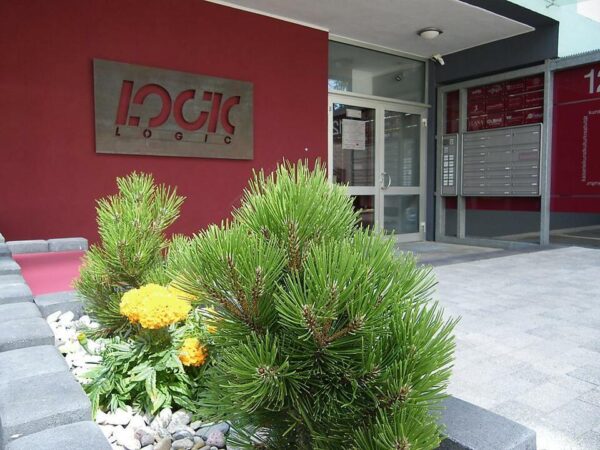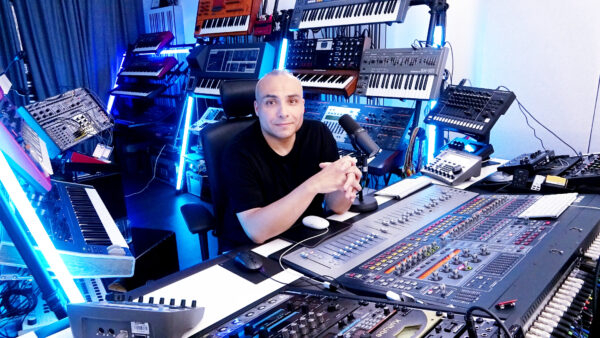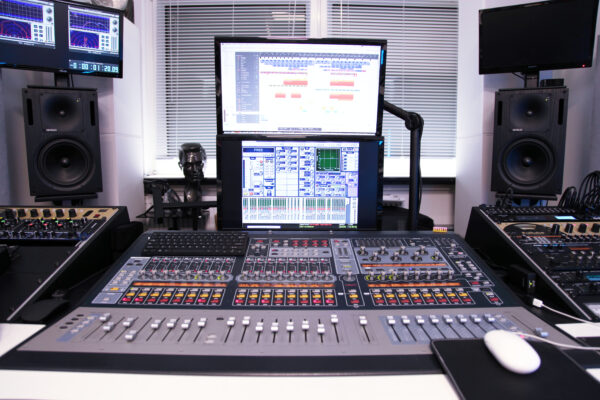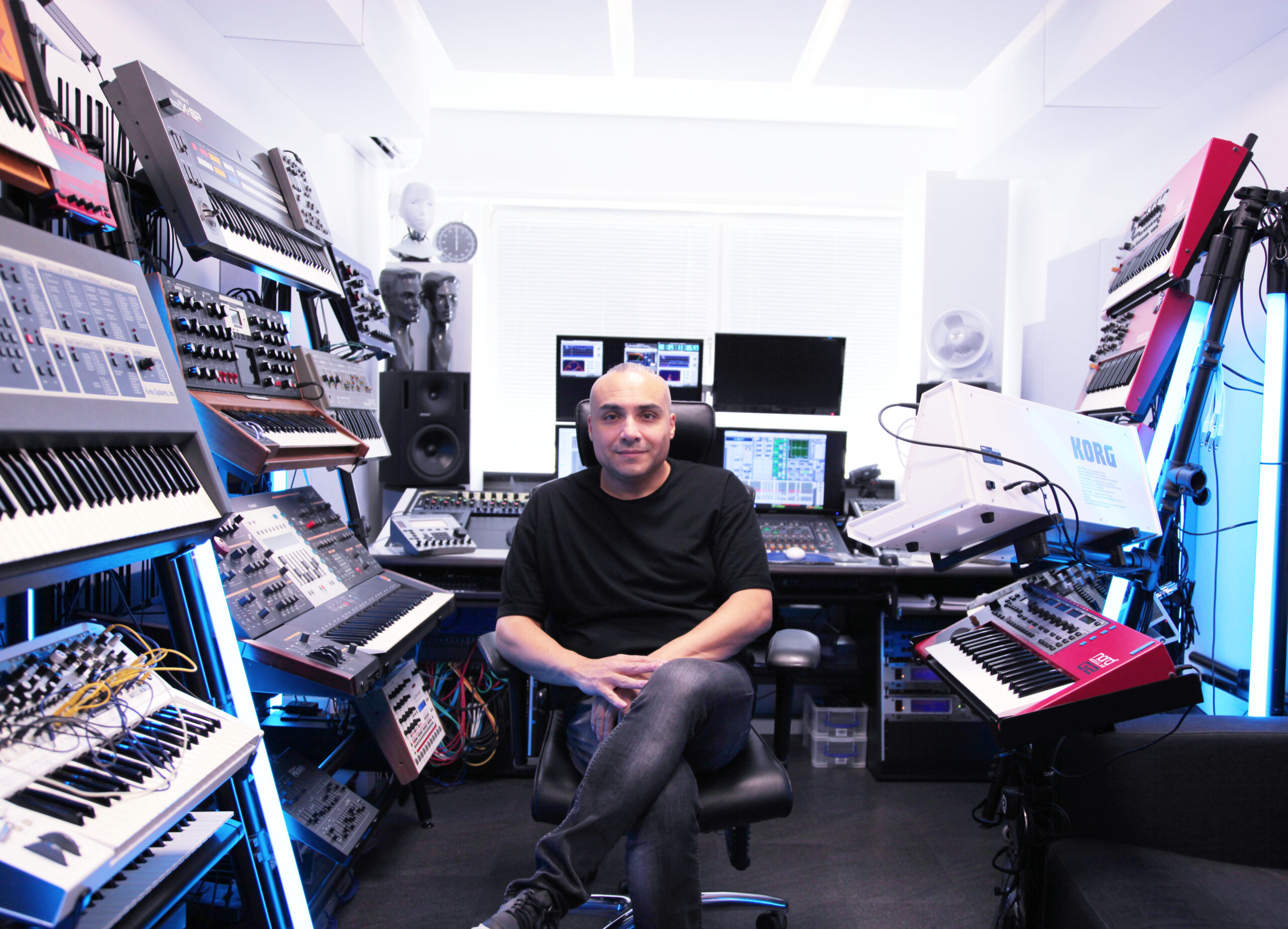To say Anthony Rother is prolific would be an understatement. Whether releasing EPs and 12 inches for the likes of Marcel Dettmann’s Bad Manners label or extensive (21 tracks) albums like AI Space via his Bandcamp page, the German artist’s output is unyielding. It’s built on an unrelenting work ethic that serves Anthony Rother as a self-contained artistic universe, complete with world-building concepts and a distinctive sound. From his online jam sessions to his hybrid Electro sets, there’s a determined purpose before he even lays a finger on the record button with an ideology that’s deeply rooted in the sound and aesthetics of Electro.
Anthony Rother has been at it since the mid nineties and after releasing his debut LP Sex with the machines, he’s been championing the sounds of the Electro genre for a whole generation. He became a prominent figure in the electronic underground in the early 2000’s with legendary records like Hacker and Popkiller combining his love for dark impulsive rhythms and humanoid vocals channelled from the formative experiences of listening to Kraftwerk. He established Datapunk during this time, a label that launched the careers of many established artists before the business end of the music all but consumed Anthony’s efforts and he took a break from music altogether around 2008.
In the process of getting some distance from the industry, he came back to making music eventually, and in a big way. Today his output schedule rivals some of his most productive years of his early career, and with a sincere and dedicated approach to Electro, Anthony Rother is more determined than ever. He is always working on music with an endless wealth of creativity spurring the artist and producer forward. His pursuits towards new avenues of exploration in the Electro paradigm have taken to extremes of the genre’s stylistic traits.
When it comes to Anthony’s music it’s pure Electro, but it’s never complacent. Always striving for something new in his music, Anthony is propelled to new frontiers and each production only functions as a way to the next. In seeking new languages in this machine music, he is always one step ahead of his curve. Albums like AI Space capture these musical developments in intricate and expansive Sci-Fi tableaus while his hybrid Electro set seeks to find a bridge between Electro and the club. It’s a self-contained musical world that he has created through his music and ever since he came back to this music, Anthony Rother has extended this immersive universe.
We caught up with Anthony Rother via telephone call to talk about this world he’s developed and his approach to Electro. Our conversation drifts into AI, Offenbach and his hiatus, but it always returns to Anthony’s first love, Electro and his eternal quest for a fresh take on the genre.
Anthony Rother plays a Hybrid Electro set at jaeger this Friday.
Mischa Mathys: Where are you at the moment?
Anthony Rother: I’m here in Frankfurt in Offenbach. I don’t know if you’ve ever heard of Offenbach; it’s the town where the Robert Johnson club is located.
MM: Yes, I’m familiar. We’ve had a few guests from your neck of the woods at Jaeger in the past. People like Roman Fluegel, Ata and Gerd Janson.
AR: Yes, these guys are from Frankfurt but Robert Johnson is in Offenbach.
MM: And your studio is also there?
AR: Yes, it’s in the old Logic Records building, a record company from the eighties and nineties which released Snap! amongst other things.They owned the building and that’s where I have my studio. Roman also had his studio there. It’s a very famous place and has a bit of history in the electronic music scene.

MM: Does it still have a musical community around it, or is it like everywhere else at the moment, every man is an island?
AR: Yeah, every man is an island. I can only speak for myself, but I go there I make my music and I leave. When I was in this building in the 2000’s, I had more to do with people on the other floors, but now I’m more concentrated in making music, than having fun, and drinking and making parties. I think my interests have shifted a little more to a different place. You know how it is?
MM: As you get older, your priorities change, right?
AR: Of course, yes. (laughs)
MM: But the music never changes?
AR: No, the music stays the same. I think today I’m more focussed on music than when I was younger.
MM: You’ve had such a prolific output, and it was a bit difficult for me to find an entry point for the sake of this interview, but I thought we could start with Bad Manners 9, which came out last year. It feels like it is a bit of an outlier to what I’ve come to know as the Anthony Rother sound in recent years.
AR: Bad Manners does not reflect what I do today. The EP is an EP that me and Marcel (Dettman) put together.
MM: It was only a brief dalliance with this style of music.
AR: You can’t say that either; because over the last ten years I’ve always worked on four on the floor tracks and experimented with these kinds of tracks, but I didn’t release the material. I just started releasing in 2017 again, with tracks on Danny Daze’s Omni Disc label. Since then they all reflect a continuous Electro style searching for a sound that works well in the club and has much energy. What I do today is purely based in Electro and writing about human problems in a digital computer language.
MM: Considering these concepts of human stories in a robot language in your work I also find you recontextualise them in a dystopian universe, but how do you arrive at these worlds; Do they come from books, movies, music or is it something that happens naturally at this point?
AR: If you see my artistic life as this evolving thing, I would say that on my debut album Sex with the Machines, I was heavily influenced by Electro from the eighties, like Karftwerk and of course sci-fi movies. It was a melange of all of this. I’ve invented some kind of language for myself based on my influences that I recreate every time I work on a new album. It’s not something that I have to work at, it comes natural to me.
MM: Is it rooted in something in your subconscious at this point and does it start with the music or at a point when you start adding lyrics or vocals to your music?
AR: Mostly it starts with the music. When I’m working on an album, I’ll have a title for the album and at this point I’ll form the ideas. Let’s take AI space (the latest album), it’s an evolution of artificial intelligence that we are witnessing now. When I started writing this album, AI wasn’t such a mainstream theme as it is now. It was the stuff of nerds. I did some research on it and got ideas for stories or personal experiences that I coat in this kind of language. It’s a back and forth, but it starts with the music, then I get a theme, and from this topic I derive all the other things.
MM: Tell me a bit about your research into AI for this album. What conclusions did you draw about the future of AI?
AR: I must be careful about what I say about the reality of the situation, because I’m an artist. I’m not a professional AI programmer, so my knowledge as an artist is to paint a picture and to discuss it in an artistic way. It’s a mainstream question, and I don’t have an opinion, because you can approach the answer in different ways. It’s a diverse subject for an artist though and you can either paint a dystopian picture of an AI that takes over a world or on the opposite end a utopian world where an AI is our digital butler.
MM: But do you have any thoughts on the reality of AI in terms of music?
AR: So, if we debate AI making music, does AI replace me as a musician? I’ve thought about it, but I don’t feel threatened. Everything that is standard music is threatened because AI is very good at learning. So for me as an artist it’s very important that my music is so special, and so forward-thinking so that AI can’t reproduce this as a cliché. But as soon as I release it, it gets into the learning stream of the AI and I have to advance myself again. I’m always in a kind of race with AI.
MM: Have you experimented at all with AI in making music yet?
AR: I have tried it, not in terms of making music, just to see what it will do. I asked an AI to make music like Musique Non Stop from Kraftwerk. And it proposed 4 tracks to me. Most of them had an Electro beat, but it was nothing like Musique Non Stop, because Musique Non Stop is such a unique piece of music that it was impossible to reproduce it.
Personally I would not use AI, because making the music is the first and the best thing, the result is just the last step. Making the music is the most fun.
MM: My experience with AI is that it lacks the imagination in that process to get to the end result, and I think this is something that is particularly unique to your music. It’s almost like you create these fantasy worlds that you are able to escape into when you make music.
AR: Exactly. In German we say, the way is the goal.
MM: I like what you said about having to be one step ahead of AI to stay progressive. In the scope of the Electro paradigm, and the stylistic traits of that music; How has it developed through your own artistic pursuits?

AR: That’s a hard question, because there have been so many phases and I’ve worked on so many different aspects of it. I’m still working on it, because in the last few years I’ve been trying to produce a kind of Electro that could be played in the club, and has the energy of Techno, but is still considered a 100% Electro.
My plan is to work in different aspects of Electro and to try and find new elements to it. I’m willing to break from the stylistic concepts to try and find something new in terms of Electro. I might have to surrender some classic elements to get to that point.
MM: What are you finding you have to surrender in terms of making it work in a club these days; is it about stripping it back and making it more functional?
AR: This is a good question. It’s a kind of energy that needs to be in the track. You can have a complicated production and it will still work in a club. You have to play it out to find out. I usually play it out and from that I know what needs to go into the next production.
MM: You don’t go back to the one you played out or an older production?
AR: No, the concept is to be one step ahead. I’m always in a kind of twilight zone, not knowing what’s going to work. I think this is the best position to be in when you’re writing music if you wanna do something fresh.
MM: Do you specifically make everything for the purpose of playing it out in your hybrid Electro set or are some things made purely for just the recorded format?
AR: I produce the music for the hybrid Electro set and I play it like a kind of DJ. I’m basically my own record shop. I produce so much music that I can play only my own music. This is the concept and this is where all the music comes from. I’m in the studio everyday, because I need so much material for the hybrid Electro set. From ten tracks that I produce, maybe one or two I can use in my set.
MM: Is the intention to release as much of that music as possible?
AR: At first it wasn’t. But now I’m releasing my albums on bandcamp. You can see it as a full artistic concept. The hybrid Electro set represents my work as an artist in all different media.
MM: So it’s its own self-contained ecosystem with you in the centre of it.
AR: Exactly.
MM: Are you able to adapt to a crowd like a traditional DJ would?
AR: I can adapt to the crowd within the limits of my own material. I have a lot of material, because I’ve produced so much stuff and I try to produce various instances of Electro. It’s not just a show. It’s not so easy to explain without using the word DJ, but I don’t consider myself a DJ.
MM: And it’s very much contained within the universe of Electro?
AR: Exactly, I tried to do it years ago with some four on the floor tracks, but then in 2016 I started shifting to Electro. During the pandemic I decided that I will play only Electro in my hybrid set.
MM: Why did you decide that?
AR: Before that I was in between, but during the pandemic I wanted to prove if it was possible to do an Electro-only hybrid set. I want to be a 100% Electro artist. If I do something else I’ll use a new project name. This is my mission till the end of my life; to find all the different aspects of Electro available.
MM: That’s a serious dedication. What is it about Electro that makes it so appealing?
AR: I think this is my nature.

MM: It seems that you clearly set out a path for yourself, which is quite the contrast to a few years back when you went on a bit of a hiatus. That seems at odds with your work ethic. Can you tell me what happened there?
AR: Yes around 2007 -2014, after the Datapunk hype, I lost myself for various reasons. One of the big reasons was that I was dragged into a kind of a business thing, which I had not enough knowledge about. I think I made every business error I could make as somebody that has no experience. I was exhausted. Everything looked so positive, but it turned out that everything was just business.
MM: What did it take for you to get back to a point where you could start making music again?
AR: For the longest time I was just trying to find myself again. I was ripped into a 1000 pieces, and I had to find the right pieces that really reflect me. In 2013 I produced Netzwerk Der Zukunft and this album helped me to put together the pieces of the real Anthony. Today I can say I’m complete in a sense that I know who I am again. I can trust myself and the decisions I make. Today I can distinguish between the business and the real stuff and the real stuff is the most important thing in my artistic life.
MM: Did you feel that when you got back to it that it was the same as that initial spark when you got your first synthesiser, when you heard Electro for the first time or when you made music for the first time?
AR: When you’re creating in a sense that you do something real, it’s always a very deep experience. It’s not the same but it’s very different in depth. When I first created Sex with the Machines (my debut album), this had deep moments, but what I do today is deeper. I have more knowledge and have more possibilities.
When you’re young, being naïve has a certain magic. This is something you lose because you get more knowledge and you gain more experience, and I’m jealous of my younger self in that regard. On the other hand when you are naïve and young you’re often two-stepping into the wrong spots. (laughs)
MM: What is your relationship today with an album like sex with the machines?
AR: I’m still listening to it. I’m still amazed by it. It’s not part of my creative process today, because that album has its own tone and is of its own time. For me it’s a great moment in my artistic career and it always gives me good energy.
MM: Is it something that you ever reference in your music today?
AR: I referenced parts of Sex with the Machines for my 2018 album 3L3C7RO COMMANDO, so yes.
MM: Looking at your studio from what I’ve seen online, it seems that you are still using many of the same old machines you would’ve used back then. How do you continue to use these machines in music that seeks to progress too?
AR: I work with old machines but I also have tons of new machines. I’m always cycling around. I have a basic setup and I change it in different ways. I’m always shifting with technology in search of that freshness in this style of music.

